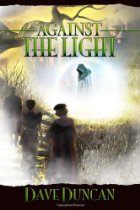 SF Canada member Rebecca Diem recently had an article appear on Tor.com. The 1983 Book Ian McEwan (and Everyone Else Who Craves Thoughtful SciFi) Should Be Reading is a thoughtful and smart response to Ian McEwan’s April 2019 controversial interview in The Guardian.
SF Canada member Rebecca Diem recently had an article appear on Tor.com. The 1983 Book Ian McEwan (and Everyone Else Who Craves Thoughtful SciFi) Should Be Reading is a thoughtful and smart response to Ian McEwan’s April 2019 controversial interview in The Guardian.
Rebecca discusses Vonda McIntyre’s masterful 1983 novel, Superluminal, along with contemporary cyborg-infused fiction in which “tensions between human and machine, the organic and inorganic, are front and centre.” She emphasizes that “our collective desire and anxiety over technological advancement form the foundation of so many of the most interesting and complex conversations happening in the genre—past, present, and future.”
Rebecca writes:
The concept of the cyborg asks that we re-evaluate our conception of humans and technology as being distinct and separate…The cyborg offers the possibility of radically reconfiguring the tensions between the organic and inorganic. As a metaphor for boundary disruption, authors like McIntyre use the cyborg to complicate our understanding of constructed dichotomies of what is human (and valued), and what is artificial (and exploited).
…The cyborg identity…is not limited to the individual body; it is best encompassed in the relationship of the body to other bodies and other technologies, in a way that complicates the apparent divisions between the self/other. Its radical potential is retained in these relationships as a means to subvert traditional paradigms.
<These cyborg identities offer> a way of reconciling tensions by refusing to (re)colonize them into a homogenized identity muddied by historical preconceptions. McIntyre’s fusion of classic sci-fi with these emergent dialogues is part of an important legacy of boundary transgression in science fiction, from the work of Margaret Cavendish and Mary Shelley to 20th-century icons like Le Guin and Octavia Butler. And the conversation continues as contemporary authors present their own take on the cyborg.
Rebecca is the author of smart, hopeful speculative fiction and poetry. Her work includes the indie steampunk series Tales of the Captain Duke, following the adventures of a defiant young aristocrat who saves a band of airship pirates from certain peril and talks her way into joining their crew. Find her at https://rebeccadiem.com/.




 SF Canada Member Greg Bechtel’s semi-autobiographical essay on Margaret Atwood, Sad/Rabid Puppies, and villainy appears in Issue 5 of the grad student journal
SF Canada Member Greg Bechtel’s semi-autobiographical essay on Margaret Atwood, Sad/Rabid Puppies, and villainy appears in Issue 5 of the grad student journal 